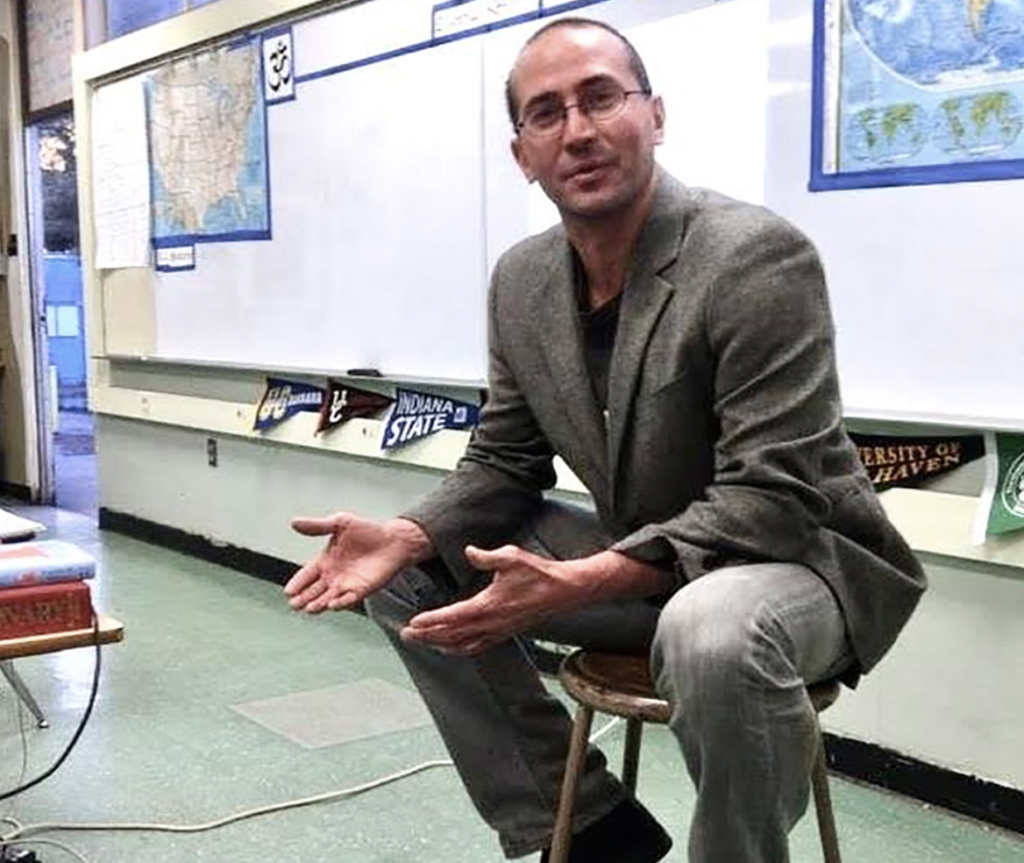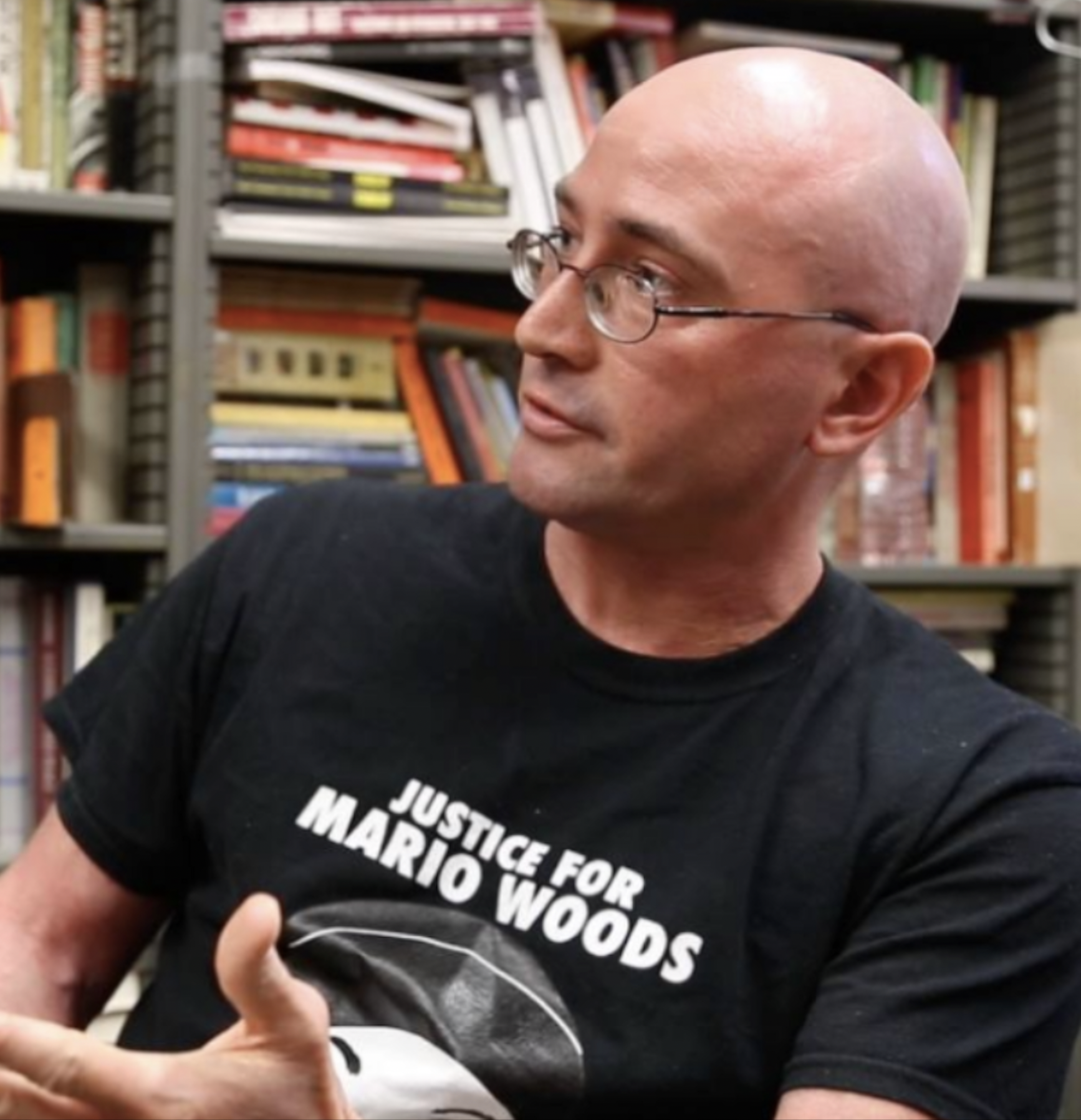In 2007, I spent a year teaching incarcerated youth in northern Arizona. That year, I discovered history as a powerful tool for helping young people wrestle with the biggest questions they had in their lives. Why was the reservation so poor? Why were there so many Black youth in jail in a region with a small Black population? Such questions also forced me up against my own ignorance as a White man born into a society that devalued history… partly, I suspected, as a means to avoid facing the contemporary ramifications of historical inequities. Night after night, I found myself in the university library until closing, trying to understand the history behind my student’s most burning questions. And so, in my mid-twenties, I became devoted to history education both as a means to empower young people, and as a means to liberate myself from my own ignorance and step into the world with more clarity and integrity.
Back in Oakland, California, I pursued a Master’s in history education and became a high school history teacher. I also continued to study racial justice history with a passion. Over the years I found that the more I learned, the more difficult it became to find materials I was satisfied with for my students. I began writing for them, composing histories both as a means to target specific learning goals, and to engage them with stories I knew would ignite their interest. When we were learning about freedom struggles, one of my goals was to help my students learn to think strategically by examining how communities organized using a variety of tactics, based on what made sense in their context. I sought to make inspiring figures relatable by portraying their growing process and emotional lives. And I did my best to portray the important roles of women, youth, LGBT figures, and others who had been marginalized in movement history.
In classrooms of primarily Black and Brown youth who sometimes experienced tensions between their communities, I also highlighted stories of Black and Brown solidarity. I brought in stories of White antiracism as well, so that White youth could see positive examples of how White folks had shown up for racial justice. It was those stories of solidarity that most inspired my students. Learning how diverse communities came together – rather than fighting their battles alone – gave them hope and a heightened sense that real change was possible. I came to see these stories of solidarity as being important beyond my classroom: seeing examples of how bonds of solidarity were built in history could help us, as a society, learn to build those bonds in the present. These stories presented an important antidote in a world of division.
I adored teaching, but by 2013 I was wondering if I could have a broader impact as a writer telling these stories. As a teacher I had learned to portray historical depth and complexity in a clear, accessible, and engaging way that I felt could also support public understanding. However, I had little time to write, let alone engage in research. I wanted to take the plunge and embrace myself as a writer of racial justice history, with a general audience in mind, but it was hard to imagine stepping away from the classroom.
In 2015, fate intervened. My mother had a health crisis that left her having to relearn how to speak and eat. She needed 24-hour care, and I stepped away from teaching to support her. While she recuperated, I spent my time researching and writing. I joined the gig economy, driving for Uber and Lyft to have flexibility as a caretaker and a writer. And I founded CrossCulturalSolidarity.com, as the home for my racial justice history writings and resources.
Fundraising for the project, however, turned out to be a heartbreakingly difficult task. Although I had initially seen driving for Uber as a temporary measure until I secured funding, I spent the next five years giving rides to 20,000 people throughout the Bay Area. This was an emotionally difficult period of struggling to figure out how to survive as a writer, in a society that isn’t exactly designed for the thriving of writers and other creative folk. For a few years I despaired, turning to the bottle for false comfort before finding my way back to the true comfort and solidity of community, spiritual practice, and the sense of agency that despair can rob us of.
During the formative years of the Cross Cultural Solidarity project, I wrote many chapter-length pieces on a variety of racial justice history topics… ranging from U.S.-Mexico border histories to stories from the legacy of Black internationalism. (You can explore those writings here, which have since been linked to everywhere from the Washington Post, to Yes! Magazine, The Black Agenda Report, and Aljazeera.) In addition to my own personal writings, I’m proud to have also built the roughly 250 racial justice resources that make up the bulk of this website.
For the past few years, I’ve been taking this work in a more interactive direction. CrossCulturalSolidarity.com now features a monthly discussion group called Black Movement Thought, which has been a joy to facilitate and is open to all. Interviewing elders of racial justice movements has also become an important part of my life… For recent examples, see my interviews with SNCC’s Mike Miller on community building, and former Berkeley Mayor Gus Newport on being mentored by Malcolm X. In the wake of the 2020 uprisings when millions of White folks were asking what their roles were, I launched The White Antiracist Ancestry Project, which uses the lessons of White antiracist history to strengthen today’s White antiracist efforts. In just three years since then, I’ve led 40+ workshops on the subject. Just as I had fallen in love with teaching in 2007, I’ve fallen in love with being a movement educator, facilitator, and personal antiracism coach.
My main role in today’s antiracist efforts is in the realm of movement education, and I generally try to keep myself focused on what I feel is my primary offering to make. That said, I imagine some readers may be curious about the wider spectrum of racial justice activism I’ve engaged in over the years. First, it’s important to say that I experienced teaching as living, breathing, and being on the frontlines of racial justice efforts every day of my life. Outside of teaching, during my time in Arizona I helped patch roofs, repair fences, haul water from windmills, and do whatever else was needed for Navajo elders on the rez who could no longer do such tasks themselves. After my time teaching incarcerated youth, I briefly organized with the prison abolitionist organization Critical Resistance, including helping to set up their epic 10-year anniversary event. After the police murder of Mario Woods in 2015, I served as the secretary of the Justice 4 Mario Woods Coalition in San Francisco, sat night watch for the Frisco 5 Hunger Strike that grew out of that, and participated in the occupation of City Hall after the hunger strikers – my friends – were hospitalized after not eating for two weeks. I worked with SURJ Bay Area during 2016 on their deep canvassing campaign that year, have put my Zen Buddhist practice to good use doing safety and de-escalation work for various protests over the years, and have canvassed and knocked on doors for more causes than I can recall. In my capacity as a movement educator and historian, I’ve also helped organize the Howard Zinn Book Fair in San Francisco since 2019. The legacy of SNCC has been one of my guiding lights as an organizer, and I curated and facilitated SNCC panels for the Zinn Fair in 2022 and 2023: You can watch the 2023 session here.
Finally, a vital and essential part of making this project possible has been growing the Patreon community over the years. Cross Cultural Solidarity is supported by a grassroots network of truly amazing people who care deeply about racial justice, and doing the work of growing that network and that community has been a beautiful and empowering experience for me. I am profoundly grateful to this project’s Patreon supporters. If you’d like to become one yourself, you can join here – you’ll get monthly updates with all kinds of inspiring new materials each month, free invites to all events I facilitate, and much more. I hope you’ll join us on this project’s journey as it moves forward!
In the spirit of solidarity,
Lynn Burnett

